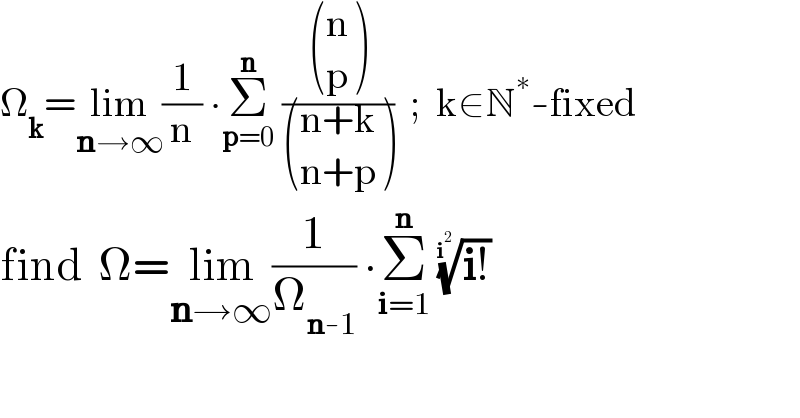
Question Number 151078 by mathdanisur last updated on 18/Aug/21

$$\Omega_{\boldsymbol{\mathrm{k}}} =\underset{\boldsymbol{\mathrm{n}}\rightarrow\infty} {\mathrm{lim}}\frac{\mathrm{1}}{\mathrm{n}}\:\centerdot\underset{\boldsymbol{\mathrm{p}}=\mathrm{0}} {\overset{\boldsymbol{\mathrm{n}}} {\sum}}\:\frac{\begin{pmatrix}{\mathrm{n}}\\{\mathrm{p}}\end{pmatrix}}{\begin{pmatrix}{\mathrm{n}+\mathrm{k}}\\{\mathrm{n}+\mathrm{p}}\end{pmatrix}}\:\:;\:\:\mathrm{k}\in\mathbb{N}^{\ast} -\mathrm{fixed} \\ $$$$\mathrm{find}\:\:\Omega=\underset{\boldsymbol{\mathrm{n}}\rightarrow\infty} {\mathrm{lim}}\frac{\mathrm{1}}{\Omega_{\boldsymbol{\mathrm{n}}-\mathrm{1}} }\:\centerdot\underset{\boldsymbol{\mathrm{i}}=\mathrm{1}} {\overset{\boldsymbol{\mathrm{n}}} {\sum}}\:\sqrt[{\boldsymbol{\mathrm{i}}^{\mathrm{2}} }]{\boldsymbol{\mathrm{i}}!}\: \\ $$
